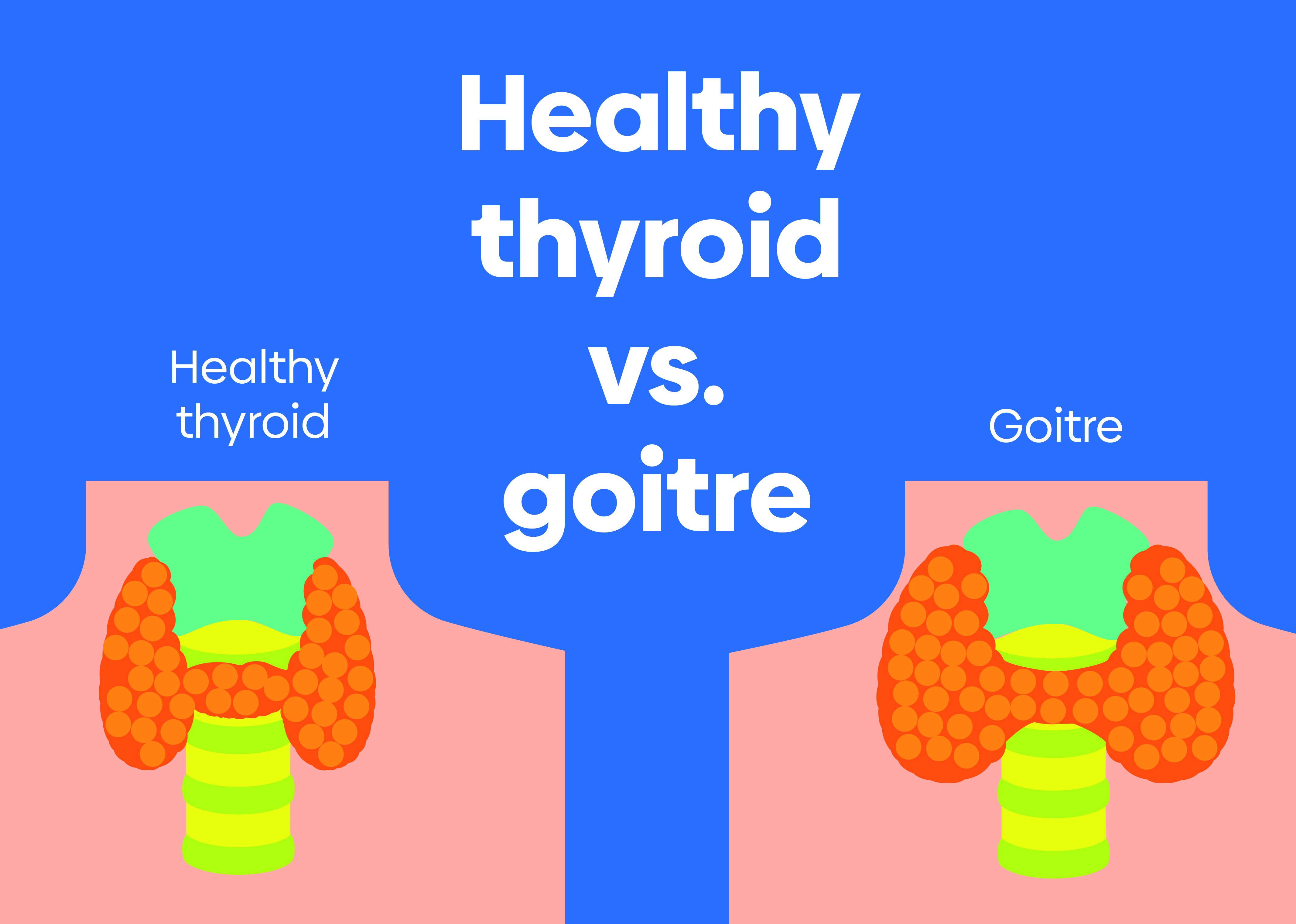If you have a lump at the front of your neck, it could be a goitre (sometimes spelled ‘goiter’). This is when your thyroid gland gets bigger than normal.
A small goitre won’t always cause any physical problems or symptoms, although it may make you feel self-conscious about your appearance. But larger goitres can cause symptoms and need treatment.
Your thyroid gland makes hormones that help regulate your metabolism – keeping your body at the right temperature and helping your brain, heart and other organs to work properly. Having a goitre doesn’t always make a difference to how your thyroid gland works, but it’s sometimes associated with changing levels of thyroid hormones, which can affect how you feel.
We know you might be worried about how you look if you have a goitre, or concerned that it means you’re going to have health problems. So read on to learn about why you might get a goitre, the symptoms it can cause, and the treatments that can help you feel yourself again.
Who is likely to get a goitre?
Anyone can get a goitre. It can be there when you’re born, or develop at any time during your life.
How likely it is that you’ll get one depends partly on what country you live in, and estimates about how common it is vary. But research by the World Health Organisation suggests it affects about 16% of people worldwide.
Things that mean you may be more likely to get a goitre include:
- being female
- getting older – goitres are more common if you’re over 40
- a family history of goitres or other thyroid problems
- being pregnant or menopausal
- not having enough iodine in your diet – this is rare in the UK and US, but more common in many other countries
- having radiotherapy to your neck or chest, such as for treating cancer

What causes a goitre?
Several health conditions and other factors can cause a goitre, including:
- overactive thyroid (hyperthyroidism) – when your thyroid gland makes too much thyroid hormone
- underactive thyroid (hypothyroidism) – when your thyroid gland doesn’t make enough thyroid hormone
- Hashimoto’s thyroiditis – an ‘autoimmune’ condition where your immune system attacks and damages your thyroid gland, which leads to an underactive thyroid
- Graves’ disease – another autoimmune thyroid condition, which leads to an overactive thyroid
- thyroid nodules – small, usually harmless lumps that can form in your thyroid gland
- iodine deficiency – you need iodine to make thyroid hormones, so not having enough in your diet can affect how your thyroid gland works. This is less common than it used to be in many countries (including the US), because iodine is added to table salt, but it’s still the most common cause of goitre worldwide
- hormonal changes – such as those that happen during pregnancy or the menopause
- some medicines – such as lithium, used to treat mental health conditions such as bipolar disorder, and amiodarone, used to treat heart rhythm problems (arrhythmia)
- thyroid cancer – this is rare and most goitres are non-cancerous (benign), but it’s thought that about 1 in 20 can be a sign of thyroid cancer

What are the symptoms of a goitre?
There are 2 main types of goitre: ‘diffuse’ – where your thyroid gland swells up and feels smooth to touch – and ‘nodular’, where your thyroid gland feels lumpy.
The signs of a goitre vary, depending on their size and what’s causing them, but can include the following symptoms.
Physical symptoms
For many people, the only symptom is a small swelling at the base of the neck. Sometimes goitres are so small that you only find out you have one during a routine medical examination or imaging test for another condition.
Occasionally, bigger goitres can block your airways and voicebox, leading to physical symptoms such as:
Hormonal symptoms
Because a goitre can be associated with your thyroid gland being either overactive or underactive, you may also have symptoms of these conditions.
Overactive thyroid symptoms include:
- anxiety
- trouble sleeping (insomnia)
- tiredness (fatigue)
- muscle weakness
- diarrhoea
- a fast heart rate (palpitations)
- sweating
- weight loss
Underactive thyroid symptoms include:
- tiredness
- feeling cold
- low mood and depression
- constipation
- muscle weakness
- brittle hair and nails
- irregular periods
- weight gain
Emotional side effects
If you have a large goitre, it can be visible to you and other people. This might make you feel self-conscious about how you look, which could lead to feelings of anxiety and low self-esteem.
When to see a doctor
You should make an appointment to see your doctor if you think you can feel a swelling or lump in your neck.
You should see a doctor as soon as possible if you have a neck lump or goitre and:
- you’re not sure what’s causing it
- it’s bigger than 3cm, or it’s getting bigger quickly
- you have a hoarse voice or other changes to your voice
- it’s painful to swallow
- you have a high temperature (fever) or night sweats
- you’re losing weight without meaning to
- you feel very tired or you’re finding it hard to manage your daily routine
You should seek urgent medical advice or go to your local emergency department if you have a goitre and it’s causing:
- difficulty swallowing
- breathing problems, including noisy breathing
How is a goitre diagnosed?
To make a diagnosis, your doctor will first ask about:
- what symptoms you have
- how long you’ve had symptoms
- if you feel things are getting worse
- whether anyone in your family has thyroid problems
They’ll examine your neck, do a general physical check-up, and may arrange blood tests to check how well your thyroid gland is working, called thyroid function tests.
They may also send you for other tests to find what’s causing your goitre and check for thyroid nodules.
Depending on your symptoms, they may refer you to a hormone specialist (endocrinologist), including if:
- you have a swelling that’s getting bigger
- your voice has changed
- you have a family history of thyroid cancer
- you’re over 65
- you have swollen lymph nodes in your neck
- you’ve previously had radiation treatment on your neck
- your breathing is making a high-pitched noise
Your specialist may arrange some hospital tests to investigate your goitre in more detail and check for any abnormal cells. These can include:
- ultrasound scan
- thyroid scan
- fine-needle aspiration biopsy
Read more about tests and scans for thyroid problems.
Goitre treatment
How your goitre is treated will depend on how big it is, your symptoms and what’s causing it. Whether its appearance is affecting you will also be taken into account.
If your goitre is small and blood tests show your thyroid gland is working normally, it will usually just be monitored with regular check-ups. But if it’s causing symptoms, it will need treatment.
Depending on your symptoms, treatment can include:
- medication – an underactive thyroid is usually treated with levothyroxine tablets, while an overactive thyroid can be treated with thionamide medication. If your goitre is caused by a lack of iodine, you’ll be given an iodine supplement, which should reduce its size but may not resolve it completely
- radioiodine treatment – if you have an overactive thyroid, this type of radiotherapy treatment can be used to destroy cells in your thyroid gland and reduce the amount of hormones it makes. Read more about treatment for overactive thyroid
- surgery – if your goitre is getting bigger and causing trouble with breathing or swallowing, your doctor may suggest removing part or all of your thyroid gland. In some cases, it’s possible to relieve your symptoms while leaving enough of your thyroid gland to make hormones as normal. In other cases, you may need thyroid replacement medication
Your health questions answered
What happens if I have a goitre, but normal thyroid function test results?
Answered by: Dr Roger Henderson
“Many goitres are associated with normal levels of thyroid hormones. Often, if your goitre isn’t causing symptoms and an accurate diagnosis has been made, no specific treatment is needed. However, you’ll need blood tests every 3 to 6 months to check your thyroid hormone levels, to make sure you don’t develop an overactive or underactive thyroid.”







